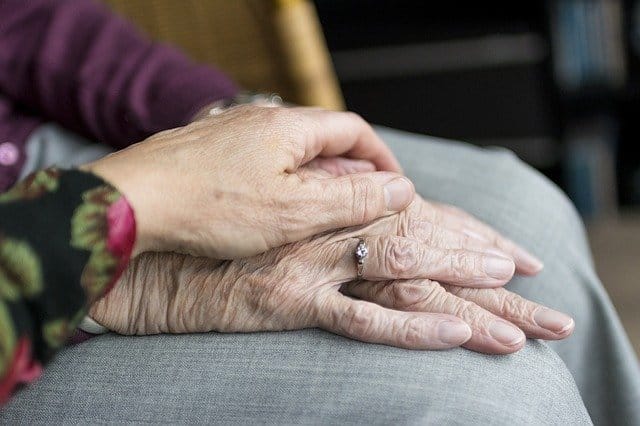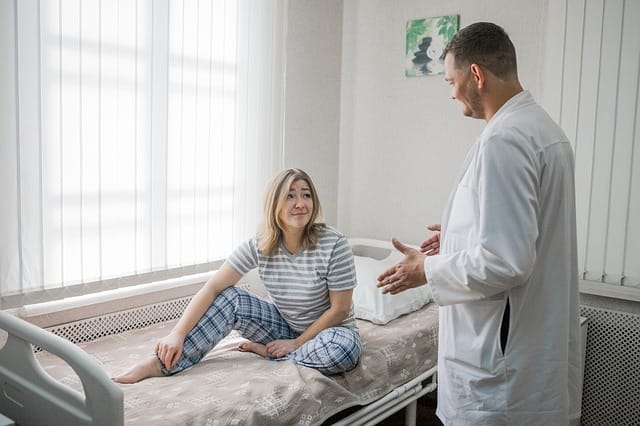Menopause is defined as the end of a person’s menstrual cycle.
This is generally defined as the time 12 months after the individual’s last menstrual period.
This can happen at any time during a person’s life but generally occurs around the time that an individual reaches their 40s or 50s.
Menopause is a natural process but can cause some serious effects depending on the individual, their unique physical differences and their lifestyle.
Most effects of menopause can be treated with lifestyle changes, but some individuals may require hormone therapy to replace the hormones that would normally be present in the menstrual cycle.
Every individual will experience menopause differently, so there is no ‘right’ way to treat it, instead with a focus being drawn to the individual’s specific symptoms and experience.
For help handling the consequences that menopause may have on your mental health, give our team a call on 0800 140 4690

Perimenopause, meaning ‘around menopause’, is the period of time leading up to, during, and after an individual experiences menopause, and includes all the symptoms that an individual will experience around this time.
As with menopause itself, this life stage can be treated with lifestyle changes, hormone therapy, as well as antidepressants to help with the mental health effects of menopause in general.
During perimenopause, an individual may experience greater emotional swings, changes in hormone levels, and drastic changes to their menstrual cycle.
This can have serious impacts on the individual’s lifestyle, work, and social life, especially if the individual begins to struggle with mental health symptoms as well.
In addition, these effects may last long after an individual has experienced menopause completely, and research is still ongoing as to how long these symptoms may last. [1]

A recent study conducted in 2023 [2] found that 91.4% of individuals who experienced menopause were never taught about it in school, and more than 60% of participants only started researching menopause once they started experiencing it.
This shows how uneducated some people are on the topic and is the reason that this blog strives to explain it further, as well as highlight the various issues that can co-occur with menopause.
At a glance, some of the most common symptoms are listed below:
This list is not extensive but shows both physical and mental health issues that can occur as a result of undergoing menopause, no matter the individual’s age.
For help handling the consequences that menopause may have on your mental health, give our team a call on 0800 140 4690

One of the most commonly recognised issues associated with menopause is the development or worsening of mental health issues.
The most common mental health issues include anxiety, depression, bipolar disorder and schizophrenia, though this, again, is not an extensive list.
Most of these issues co-occur within the general umbrella term of ‘stress-related’ mental health issues – often due to the realisation of growing older, as well as the physiological changes that occur as a result of this. [3]
Mental health and menopause are heavily linked, with many mental health issues being directly related to menopause and its effects, but with many other issues also occurring as well as menopause, creating a difficult situation (both physically and mentally) for the individual experiencing it.

Studies in the past have found that depressive symptoms are present in 38.5% of individuals within a sample who are experiencing or who have experienced menopause, (4) further showing the impact and commonness of specific mental health issues associated with this life stage.
As well as directly increasing the likelihood of mental health issues, menopause can also indirectly cause serious mental health issues due to lifestyle changes and physical health issues that an individual may experience.
For example, if the individual begins to experience issues with their sleep, then this may begin to affect their mental health – a lack of sleep can have serious impacts on an individual’s well-being.
Studies show that sleep disturbances during menopause can happen in up to 53% of cases, [5] again showing the commonality of these issues.
Often, menopause is seen as a negative transition in an individual’s life, with up to 54.1% of individuals reporting negative attitudes during this period of time. [6]
In most cases, this is seen as a result of the negative body images that many individuals hold during this time and is related to the distorted bodily perceptions that individuals may hold at this time.
Though these changes are completely normal and happen in almost all cases, it is still often seen as a bag thing, with many individuals developing struggles with depression and depressive symptoms as a direct result of it.
Depression is one of the mental health issues that is most commonly associated with menopause, but this does not mean that it is the only mental health issue that these individuals may experience.
In fact, there are many issues that an individual may experience, sometimes on their own but often with co-occurring disorders – something that should be treated appropriately and as soon as possible.

During menopause, the levels of oestrogen in the individual’s body is known to decrease, and this comes with its own issues, creating the risk of both physical and mental health issues.
For example, many of the symptoms of menopause can be associated directly with the reduction in oestrogen production in the body.
The most common of these include drying skin, slower healing, and the causes of hot flashes.
All of these in themselves could cause struggles with mental health.
For example, if an individual feels insecure about their dry skin, then they may begin to develop serious mental health issues as a result of this, including poor body image, self-confidence issues, and general anxiety surrounding their appearance.
This shows how the physical impacts of menopause can have real-life mental health implications, and therefore provides a starting point for individuals to begin specialised treatment, individual to them.
Similar to oestrogen, the levels of progesterone also decrease, coming with its own issues.
Progesterone levels, for example, are linked with cognition skills, meaning that individuals who experience a reduction in progesterone levels may also experience struggles in concentration, processing of information, and general difficulties in functioning in their everyday lives.
Some studies have shown that when progesterone is introduced to those who are undergoing menopause or those who are post-menopausal, cognition is shown to increase, highlighting its importance in treatment. [7]
For help handling the consequences that menopause may have on your mental health, give our team a call on 0800 140 4690

Because of the mental health issues that an individual may experience during menopause, there is also a higher risk of individuals who are going through menopause (either perimenopausal or post-menopausal) who may begin to consider suicide more strongly or begin to idolise suicide more and more.
One study showed this specifically, showing how suicide ideation reduced over an individual’s experience of menopause, [8] but another also showed how suicide ideation reduced in general over an individual’s reproductive life cycle. [9]
If you or someone you know is struggling with these issues or has talked about it in the past, then it is important that these individuals seek help as soon as possible or speak to someone else as soon as they feel able.
This will ensure the greatest access to care, as well as the most suitable forms of treatment beginning sooner rather than later.

As with all mental health issues, there is a risk that individuals who experience symptoms of a variety of mental health issues may turn to addiction (also known as a substance use disorder) in order to alleviate these symptoms.
Known as a dual diagnosis, this is when an individual is diagnosed with multiple mental health issues and is recommended treatment for both (or all) of them.
An individual experiencing menopause, for example, may turn to substances as a way to cope with their symptoms, as well as feel better about themselves and the situation around them as a result of the effects of substance use and/or abuse.
Addiction is a disorder that can quickly worsen over time, with some symptoms taking long periods of time to overcome and treat effectively.
This is why it is vital that individuals struggling with addiction, menopause, and any other mental health issues should seek support and advice as soon as possible.
For help handling the consequences that menopause may have on your mental health, give our team a call on 0800 140 4690

As well as the mental health impacts of menopause, there are also some physical changes that individuals are likely to experience.
This is as a result of the changing hormones in the individual’s body which can lead to a variety of different effects and issues [10] – most of which can then, in turn, lead to further issues (both physical and mental).
This makes menopause a vicious cycle in some instances, as physical health issues can lead to mental health issues which can lead to further and further issues throughout the period of their menopause, but also long after and into their future.

Known as a correlation between hormonal changes and behavioural impacts, mood swings are common amongst individuals undergoing menopause. [11]
With a hormonal imbalance also experienced during the menstrual cycle, individuals can experience severe mood swings, going from happy and confident one moment to feeling self-conscious and shy within a short amount of time.
Not only can this have an impact on the individual’s everyday life, but it can also be incredibly tiring for them, with sudden and often strong emotions overtaking their behaviour and causing a variety of outcomes depending on the individual’s specific situation.
For help handling the consequences that menopause may have on your mental health, give our team a call on 0800 140 4690

With changes to metabolism, it is not uncommon for individuals undergoing menopause to experience a range of body image issues, as well as eating disorders as a result of this.
For example, if an individual feels as though they are gaining weight as a result of menopause, then they may begin to restrict their eating or alter their eating patterns in order to ‘rectify’ this.
This can lead to a variety of issues as individuals in this situation often require proper nutrition in order to maintain the healthy aspects of their life, and reducing their intake of nutrition may seriously impact their experience of menopause, often making it worse in many instances.
Individuals undergoing menopause should carefully consider their diet [12] and get specialist support and advice when and where needed.

There are many ways that an individual can access support for the symptoms and changes that they will experience during menopause.
This can be anything from simple steps such as talking to a close friend or loved one about their symptoms, but it may also be something more complex and specialist such as seeking therapy and/or counselling in some form.
The following subheadings outline some of the key ways in which an individual may be able to access support, as well as some key tips for staying on top of their health and well-being.
As mentioned, several times across this blog, menopause can seriously impact an individual’s sleep, sleep pattern, and quality of sleep, [13] meaning that these individuals may often struggle with issues such as insomnia and difficulties in getting the right amount of rest.
This is why it is important that individuals respect their sleep pattern, ensuring to aim to get the right amount of sleep for their lifestyle, turn off any electronics a couple of hours before attempting to sleep, and tracking their sleep in general.
This can both help the individual to keep a record of their sleep, but may also help a medical professional in the future should they need sleep supplements or medical intervention.

As well as keeping an eye on the individual’s sleep, they should also aim to make other positive life choices that will improve their health in other areas of their life.
For example, though the individual may not always feel up to it, it is still important that they try to implement some form of exercise into their everyday life.
This can be something as simple as taking a walk or speed walk every day but could also include taking up an activity such as yoga, pilates, or other full-body exercises to improve general health.
In all situations of menopause and mental health issues, it is vital that individuals undergoing this transition keep medical professionals up to date with their physical and mental symptoms, meaning that any changes can be made to their care program as soon as is necessary, not once they have been struggling with these issues for a long period of time.
By keeping others aware of their situation, individuals are far more likely to be able to access suitable care, as well as affecting the timescale of this.
In addition, any sudden changes to the individual’s health can be treated as soon as possible rather than letting the individual struggle and risk making these issues worse.
For help handling the consequences that menopause may have on your mental health, give our team a call on 0800 140 4690

As with all issues, both physical and mental, there is always a struggle to provide support for every individual case from a healthcare point of view.
This means that not everyone (especially in the UK) will be able to access specialist and tailored care that they may need due to the supply and demand of these forms of care.
However, every individual who menstruates generally goes through menopause at some stage in their life, meaning that the healthcare system should be able to support this, but this is not always the case.
This is an ongoing issue and is the reason that there are so many other forms of support available in the modern world.

To learn more about menopause and its differing effects on mental and physical health, check out Rehab 4 Addiction’s information pages today.
Though Rehab 4 Addiction specialises in support for addiction and substance use disorders, there are many other forms of support that we can provide for individuals who may be struggling with mental health issues.
To learn more about how we can help you or someone you know, get in touch with our friendly, confidential, and professional team today by calling our support line on 0800 140 4690 today.